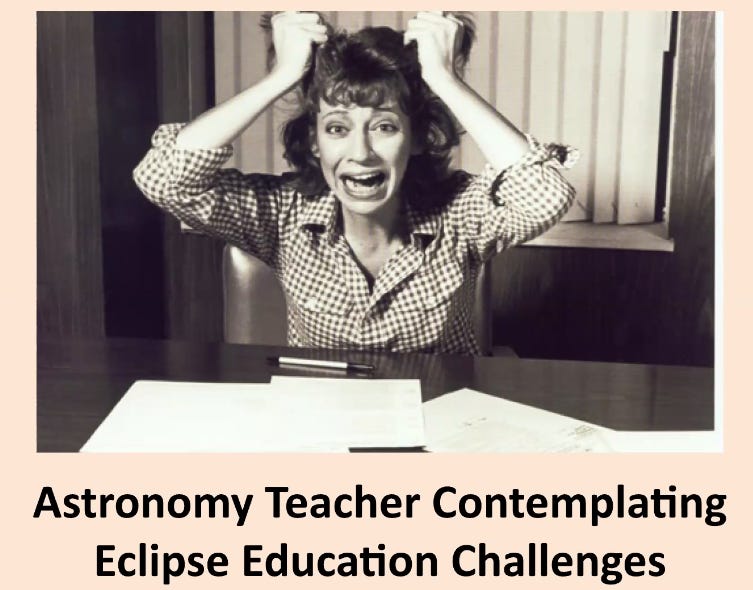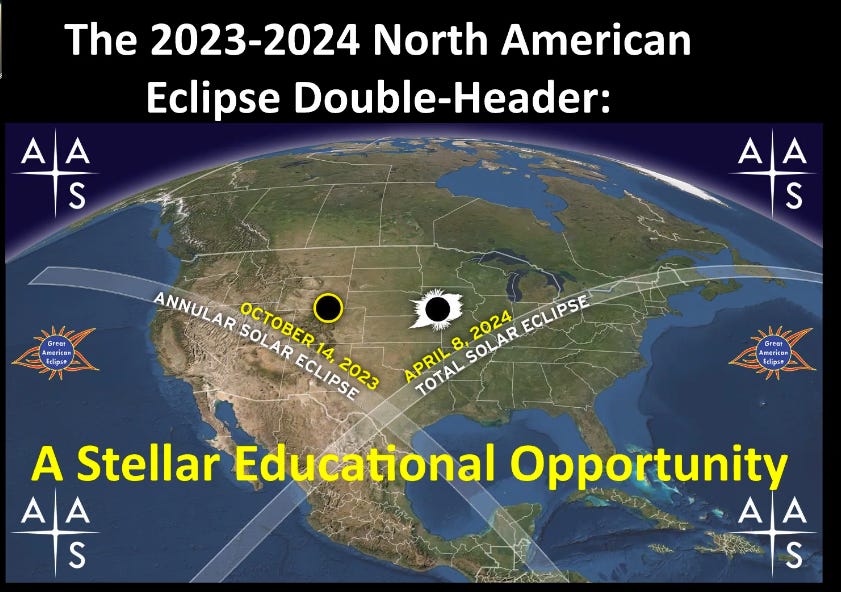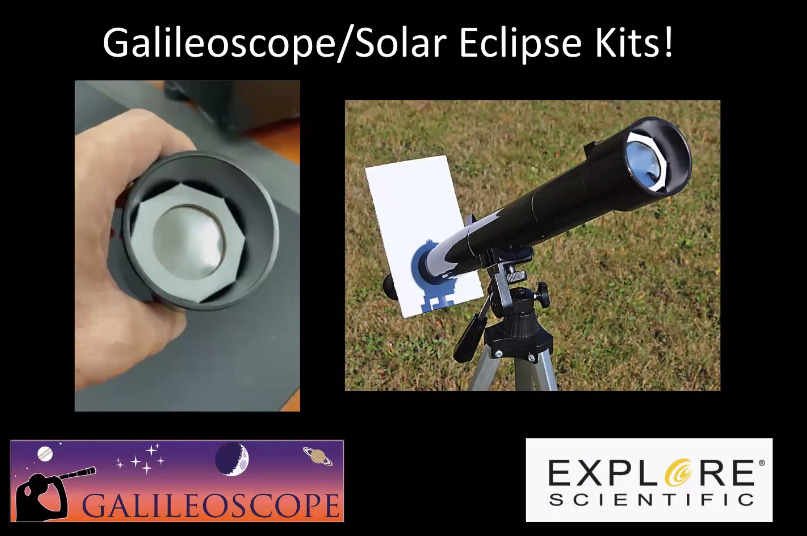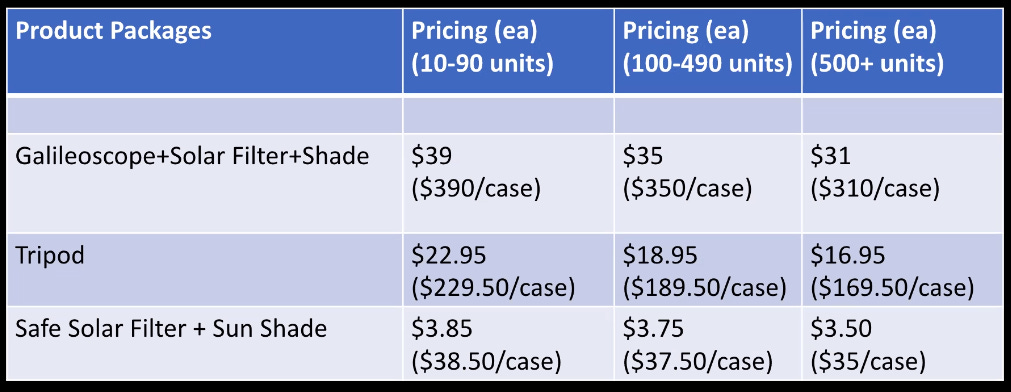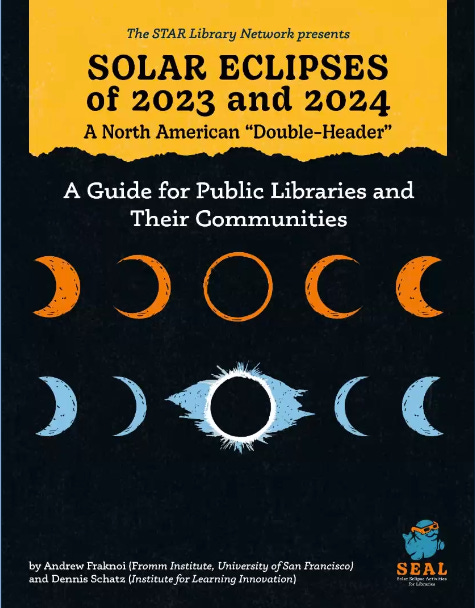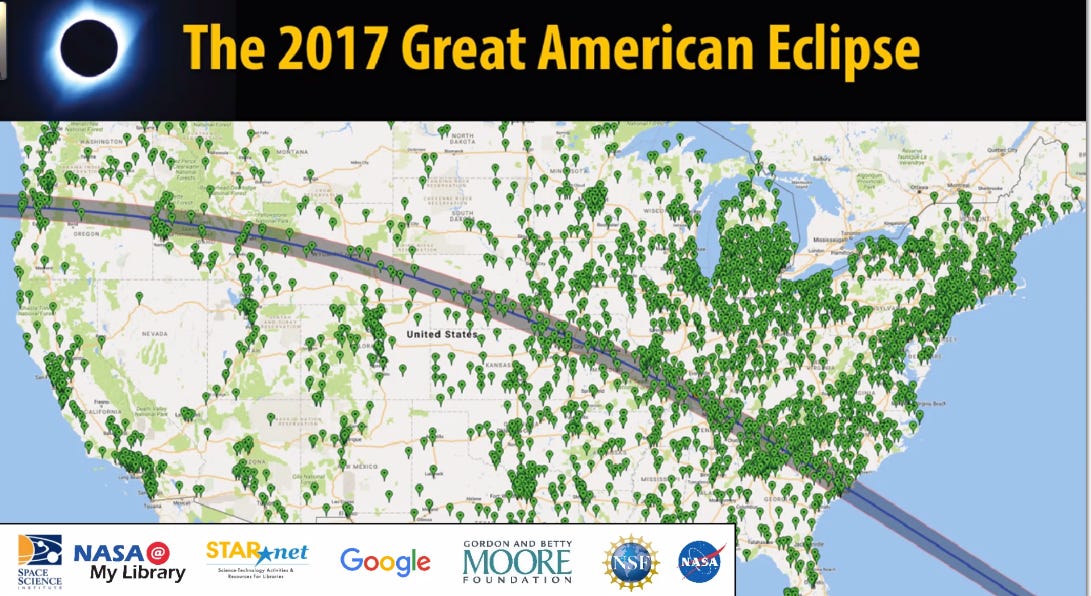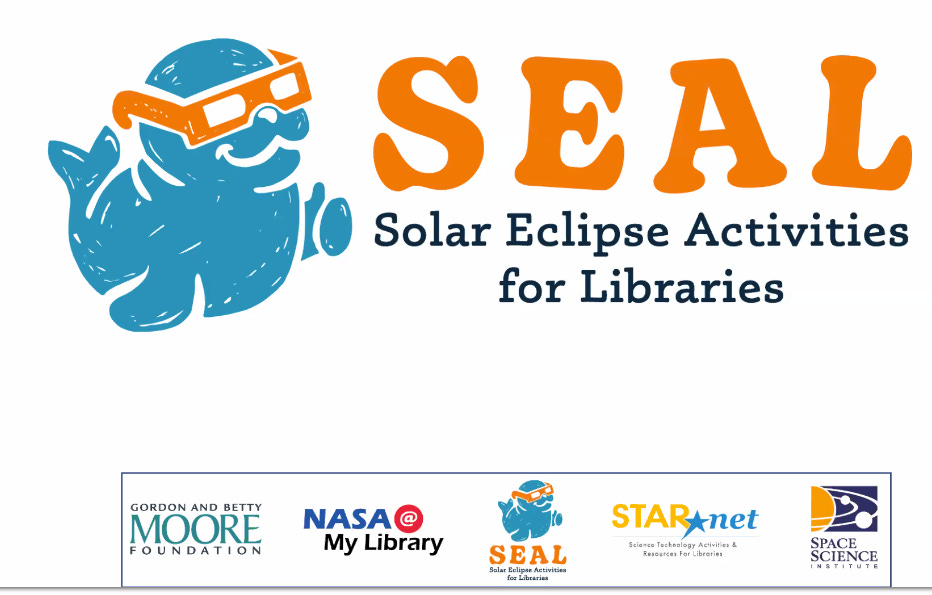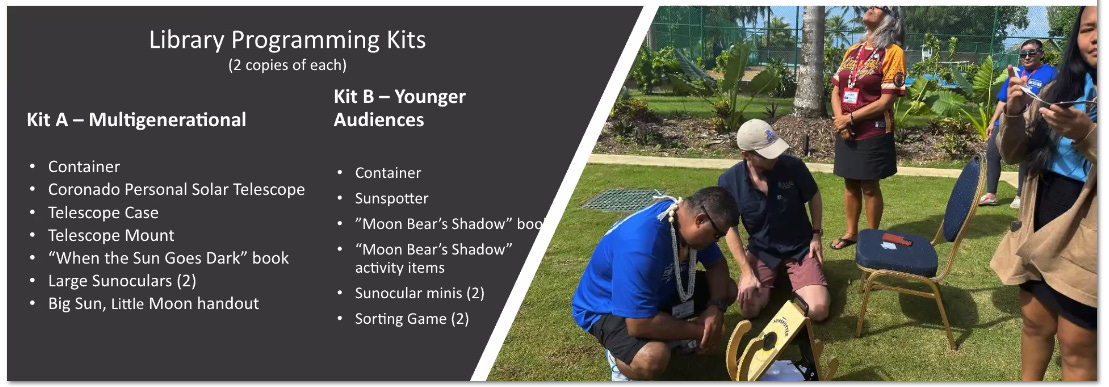#46 - Aids and Resources for the Two Upcoming Solar Eclipses - 7 Total Stories [Free Post]
TCA 2/15/23: An All-Eclipse Issue--AAS Eclipse Preparation Sessions; MSU Shooting Commentary
Cover Photo - Challenges with the Upcoming Two Solar Eclipses
In This Issue:
Cover Photo - Challenges with The Upcoming Two Solar Eclipses
Welcome to Issue 46! (plus Commentary on MSU Shooting)
Astronomical Teachniques & Connections to the Sky (AAS Solar Eclipse Sessions) -
- Prices on Solar Galileoscopes Revealed
- Solar Eclipse Things to Talk About
- How Many Will See The Eclipse?
- Guides Available
- The Eclipse at Your Library
- Live Streaming The EclipseThe Classroom Astronomer Newsletter-Inbox Magazine #45 [Paid Post] Highlights
The Galactic Times Newsletter-Inbox Magazine Highlights #41
Welcome to The Classroom Astronomer Newsletter-Inbox Magazine #46 !
Shooting at Michigan State University
I don’t normally bring in political commentary here but this one hurts. In my academic history, I earned an M.A.T. degree in Planetarium Education there, a now-defunct program centered at Michigan State University’s renown Abrams Planetarium, back in the 1970’s. I use their Sky Calendar for reference. I also earned my first teaching certificate there, and my first experiences teaching in schools were in East Lansing. So February 13th’s shooting on the campus really hits home. MSU led me from pure science into education, and immediately afterwards into my moving out of the North.
In my life as a long-time freelance science and astronomy journalist as well as a long-time astronomy and science educator, I have had the unlucky experience of seeing and experiencing far too many violent events. My first one happened even before that, as an undergraduate, with literally a gun in the stomach at my fraternity house during a break-in. How I survived that and stopped the guy from getting any further into his robbery still surprises me and my brothers. I have never been in the military, law enforcement, or government agencies, yet I have witnessed several terrorist and military events firsthand as well as bank robberies and such. I have just been too often in the wrong place at the wrong time, but not as wrong as those I knew who were there and didn’t get survive them.
So forgive me if you don’t like what I say here but if you happen to think that this MSU shooting is a tragedy but see no reason why America has to give up its guns, then I suggest you either go fight in a place like Ukraine or re-enlist in the Army Reserve. THERE IS NO REASON FOR PEOPLE TO DIE IN CLASSROOMS OR ANY OTHER CIVILIAN ENDEAVOR BECAUSE OF GUNS. The idea that good guys with guns are there to put holes in bad guys with guns has as much statistical significance as craters on the Moon with water compared to the number of other holes in the Moon’s surface are a valid reason to go the Moon. There are other good reasons to go to the Moon. Water ice in holes isn’t one of them. We have since learned the shooter had a history of violence with guns and STILL was able to get one.
Just because in 1790 some guys said we should be allowed to have muskets to defend against invading British, Spanish, French or Indians doesn’t mean the thought is valid in 2023. Sorry, this isn’t 1790 anymore, I don’t think we’re going to having musket-waving Brits, Frenchies, Spaniards or Native Americans invading us, and today’s Chinese or Russians are more likely to use missiles that even AR-15s won’t stop. In 1790 Blacks were slaves and worth 2/3rds a White man, and women weren’t worth anything—they couldn’t vote. We changed both (at least, legally). We can change this. We HAVE to change this.
When children can’t control themselves, we take away their things. We don’t seem to be capable of controlling ourselves with guns. They should be taken away until we do. Yeah, some people do know how to handle guns; we can find ways to accommodate that—other countries do—but having three hundred million guns readily available to anybody today just isn’t good.
I’ve personally seen enough gun deaths. I don’t need to see more, and neither does this nation. If you don’t like my thoughts on this, well, you can feel as free to choose to unsubscribe from this free newsletter as much as most of you feel free not to use your credit cards and get a paid subscription to The Galactic Times InDepth or The Classroom Astronomer newsletters (and to those of you who HAVE paid for a subscription, I bow to you and thank you…but….). I choose to say ENOUGH OF GUNS and to say freely to you that the Universe doesn’t care about whether you live or die. But I do.
Dr. Larry Krumenaker
- - -
Kind of a special issue here. Much of a Monday afternoon at the American Astronomical Society meeting in January was devoted to solar eclipse outreach planning. Announcements, offerings, advice, and more. In this issue is some of the best of the most general materials (the Paid TCA issue has some other material of a more specialized nature).
- - -
Key websites: Homepage for The Classroom Astronomer, with its index to all Inbox Magazine issues’ contents, by celestial object, educational subject area, grade level or venue, and with complete Tables of Contents:
https://www.classroomastronomer.com . The ultimate home of our Universe — Hermograph Press — has its homepage at: www.hermograph.com and its Store, for educational materials and books, at: www.hermograph.com/store .
- - -
Thanks!
Publisher -- Dr. Larry Krumenaker
Astronomical Teachniques & Connections to the Sky (AAS Solar Eclipse Sessions)
Prices on Solar Galileoscopes Revealed
In a past issue we reported that the Galileoscopes that had been introduced for the 2009 International Year of Astronomy were being reintroduced with solar filters and tripods for the upcoming eclipses. The prices were revealed at the January AAS meeting. The scopes will be available in lots of 10 and pre-orders were asked for in order to ascertain an initial manufacturing run by Explore Scientific. Pre-orders can be made at http://galileoscope.org/preorder and must include a 50% deposit. The first batch will be delivered this summer and more thereafter during the 2023-24 academic year.
Solar Eclipse Things to Talk About
Looking for things to do concerning eclipses?
NASA’s Chris White, an eclipse coordinator, had some ideas. I took some notes and list them here with my own comments added - LK
Of course you have to talk about the types of eclipses—solar and lunar, and then total, annular and partial for the solar types. For the latter, you must talk about safety issues, how to protect your eyes, and how to find or make safe devices to see the eclipse phases. Further, how during totality—AND ONLY DURING TOTALITY—is it safe to look at the Sun without solar glasses or other proper viewing devices.
Talk about the Sun itself. The parts of it. What we see and how we see the parts (or don’t). How it is a star closeup and how other stars we see at night are the same, and different.
Talk about magnetic fields, of both Sun and Earth. What causes them and what effects they cause. How the Sun’s affects the Earth’s and how THAT affects us down below.
How does life on Earth react to eclipses? How animals, birds, etc., respond to the darkening during the day?
Cultural ties to eclipses. How people have reacted in history, and today? How education has changed our views of eclipses.
Most planets have moons and they cause eclipses on those other worlds. Do those other worlds have eclipses as dramatic as ours? Nope. How come?
Solar missions. How have we gone from studying the Sun with telescopes, and real and artificial eclipses, to space probes that observe the Sun all the time and even touch the Sun to learn more about our star?
Historical studies about or using the Sun, such as the discovery of helium there before finding it on Earth. Photographing the Sun to find its gravity shifted the position of stars, per Einstein. Proving the planet Vulcan (not Spock’s world!) did not exist.
Other things you can observe during eclipses, such as shadow bands, pinhole crescents, pre-totality corona streamers, and more.
How Many Will See The Eclipse?
These two eclipses are a massive show for many people but only a few will be lucky enough to be in one or the other pathway of the totality or annularity of the event(s). [And a lucky few in west central Texas are in both!] But MILLIONS will be in view for a partial eclipse! How many?
The USA? 332 million.
Canada? 37 million.
Mexico? 129 million.
TOTAL = 498 MILLION. That’s a lot of potential people to educate, inspire, and get interested in astronomy and science.
Guides Available
Some resources noted in various talks—-
An eclipse book for free by Dennis Schatz and Andrew Fraknoi, available via STARnet (see below):
2. NSTA’s existing and updated eclipse guides for teachers:
Go to www.nsta.org .
3. On YouTube [but they didn’t give specifics :( ] are these three eclipse videos from Arizona State University and Infiniscope, written as medieval kingdom stories:
The films talk about the Earth-Sun-Moon arrangements, the size of shadows, and why we don’t see eclipses every month.
The Eclipse at Your Library
The Space Science Institute is making a big push to use libraries as focal points for eclipse outreach. Their reasoning is interesting.
70% of US citizens visit their local library at least once a year and often more frequently.
Library patron demographics are a 1:1 match for local demographics, often not the same pattern as other outreach programs.
Staff are educated and trained and eager to try new things to reach patrons.
Libraries are considered safe and important places in communities and provide support for government services, translation services, safety resources, and other community outreach programs.
Furthermore, libraries are found distributed wherever the citizens are.
SSI’s educational service, STARnet, is providing a library-dedicated operation called SEAL, Solar Eclipse Activities for Libraries.
One of the things SEAL will do is distribute 5 million safe solar viewing glasses to libraries, just for signing up with them. SEAL has already started doing workshops and training sessions in all 50 states (Subject Matter Experts are needed and welcome!). And they are capable of providing two sets of kits to libraries for eclipse education.
For more information or to sign up OR to join and take part, email Anne Holland at aholland@spacescience.org, go to www.starnetlibraries.org, or use the QR code here:
Live Streaming The Eclipse
The Exploratorium Science Museum in San Francisco will be offering four different Live Streams on its YouTube channel of each eclipse, see http://www.exploratorium.edu/eclipse starting in April 2023. For each eclipse, there will be two telescope-only (no commentary) live streams and two live with commentary, one in English and one in Spanish.
The Exploratorium also offers hands-on tutorials on eclipses, making eclipse viewers, and other ‘science snacks’ on its website.
The Classroom Astronomer Newsletter-Inbox Magazine #45 [Paid Post] Highlights
Cover Photo - Ring of Fire
Welcome to Issue 45!
Deeper Looks - AAS: School-Sized Radio Telescopy
Connections to the Sky -
- Replicating a 1930s Experiment the Modern Way—Animals and Eclipses
- A Funding Opportunity from NASAAstronomical Teachniques - What Can You Learn With a Ring of Fire?
The Galactic Times Newsletter-Inbox Magazine #41 Highlights
Cover Photo — Yes, Days are Getting Longer But Not As Long As They Could Have Been!
Welcome to Issue 41!
AAS: Why is Our Day a Day Long? (Cover Story)
Sky Planning Calendar —
* Moon-Gazing - Moon and Planets Meeting Everywhere!
* Observing—Plan-et - Venus, Jupiter and Mars Have the Whole Show
* Border Crossings
* For the FutureAstronomy in Everyday Life - Eating and Clubbing at the Planets




